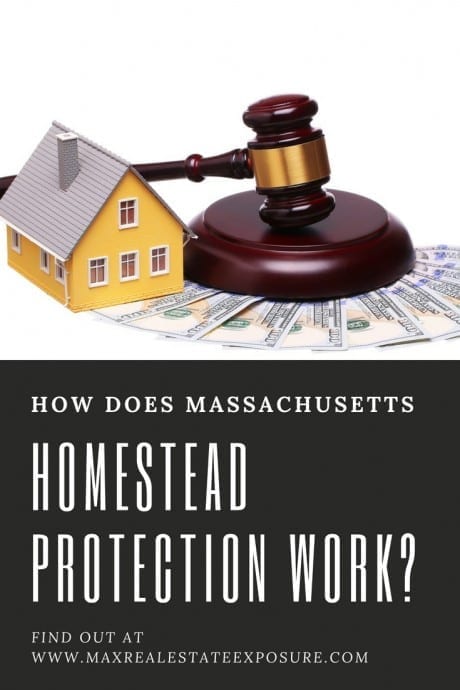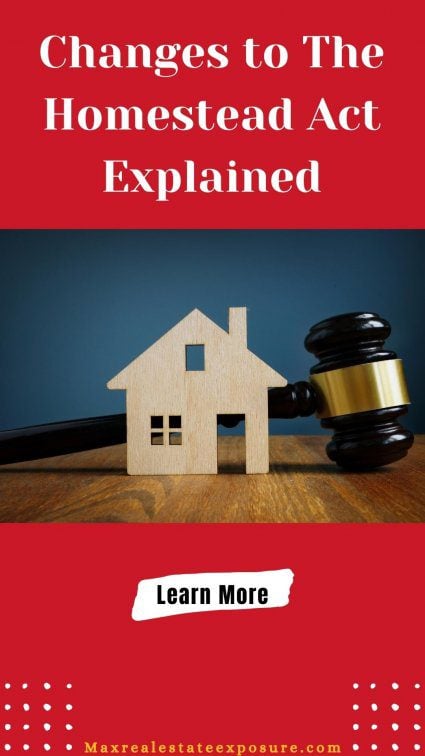 Are you wondering what the Homestead Act in Massachusetts is and how it works?
Are you wondering what the Homestead Act in Massachusetts is and how it works?
Would you like to know how to homestead your house? We will be covering in-depth what a declaration of homestead is.
When you are buying a home, certain things are vital to have. One of them is home insurance, which most people know about.
There is another form of insurance that you may not have heard about, called Massachusetts Homestead Protection.
By the time you’re done reading, you will become familiar with the Homestead Act in Massachusetts if you are currently unfamiliar with it.
It’s one of the best forms of insurance you can have.
Suppose you are considering purchasing a Massachusetts home. In that case, your real estate attorney or even the bank’s attorney may ask you if you want to have Massachusetts Homestead Protection.
Folks, this is one of the easiest Real Estate decisions you can make. Please raise your hand immediately and say you want it.
The Massachusetts Homestead Declaration provides one of the most important types of insurance on your home!
From almost forty years of experience as a real estate agent, I know many people don’t know their rights under the homestead exemption.
It’s not that unusal as most folks don’t know homestead laws before buying a home. As an owner the value cannot be understated.
Let’s examine everything you should know.
Essential Points to The Declaration of Homestead in Massachusetts
- The Massachusetts Homestead Act is a state law that protects homeowners from the forced sale of their primary residence.
- It allows homeowners to declare a homestead exemption, which provides a certain amount of protection against creditors.
- The Homestead Act helps safeguard homeowners from losing their homes due to financial difficulties or lawsuits.
- The Homestead Exemption Law protects homeowners who may be considering bankruptcy, dealing with a lawsuit, facing a tax lien, or receiving a claim from a creditor. It should be noted, however, that this protection is not comprehensive.
- To qualify for the benefits of the Act, homeowners must file a Declaration of Homestead with the Registry of Deeds in their county.
- Massachusetts designed the Homestead Act to provide individuals and families with a sense of security and stability in their homes.
- There is automatic protection of your equity up to $125,000.
- It will protect up to $500,000 in equity when filing the declaration of homestead form.
- Allows both spouses in a family to file for protection.
- You do not need to refile for homestead protection when refinancing your mortgage.
- Will protect properties in a trust.
What is The Homestead Act in Massachusetts?
The Massachusetts Homestead Act is under General Law (MGL) chapter 188. The homestead law states that an Estate of Homestead protects a homeowner.
A homestead estate protects a person’s residence from most creditors. It doesn’t matter if the property is a single-family home, condo, or townhouse.
Automatic Homestead Exemption
Section 4 of MGL Chapter 188 gives automatic homestead protection to Massachusetts homeowners for $125,000 against unsecured creditors, as long as the property is their principal residence. Unfortunately, your vacation home cannot be covered.
Automatic homestead protection is excellent, but you can go further by filing the homestead exemption form.
Who Qualifies For The Exemption?
Any individual or family who purchases a home in Massachusetts qualifies for the exemption. The Massachusetts Homestead Act extends eligibility for homestead protection to all homeowners who occupy or intend to occupy their primary residence in the state.
This includes individuals, families, and even certain trusts. The Act does not discriminate based on age, income level, or other demographic factors.
Whether you own a single-family home, condominium, or cooperative unit, as long as it is your primary residence, you are eligible for homestead protection under this legislation.
It is important to note that the Massachusetts Homestead Act provides varying degrees of protection depending on the type of property and the specific circumstances of each case.
File The Declaration of Homestead Form

Filing the Massachusetts Homestead Exception will increase the protection of the equity in your home up to $500,000 if a lawsuit is brought against you.
The exemption amount is being raised by $375,000 by filing the form.
So, if someone sues you, they would be unable to touch $500,000 of your home equity through an attachment and subsequent levy on executing the sale.
In other words, you cannot be forced to sell your home to satisfy a judgment against you.
As most people realize, we live in a litigious society. You should not risk getting into an accident and someone suing you lightly. It happens to quite a few people every day.
Massachusetts homestead protection is something no homeowner should do without!
Are There Different Types of Declaration Forms?
Yes, there are two different forms under the Homestead Act in Massachusetts. One is filed under section 3, and the other is under section 2.
Section 3 of the Homestead Declaration
The Homestead Declaration document under section 3 is filed for family homes. It is also filed under section 3 when a property is held in a trust. In this circumstance, a trustee must file.
The house must be a principal residence to get the complete $500,000 Homestead Protection.
Section 2 of the Homestead Declaration
If you are a disabled person or elderly considered 62 or older, you’ll file under section 2. They are known as elderly homesteads.
Under Massachusetts law, a disabled person’s permanent physical or mental impairment meets the disability requirements for supplemental social security.
When filing under this section of the Massachusetts Homestead law, you must attach a certified copy of a disability letter by the United States Social Security Administration to the Declaration of Homestead form.
A letter signed by a licensed physician registered with the Massachusetts Board of Registration in Medicine is also acceptable. The letter must state a declarant is a disabled person as defined by 42 USC 1382 (a) (3) (A) and (C).
What information is Required to be Filed?
To file under the Massachusetts Homestead Act, you will need the following information:
- The names of the owners and any non-title-holding spouses.
- The address of the property
- A title reference for the home – no title reference is required for a mobile home or manufactured home.
- All owners must sign the declaration and have it notarized.
- The marital status of all owners must be declared.
- A disabled person will need to have their disability letter attached.
Where Do You File For Homestead Protection?
You need to file the Homestead protection document at the registry of deeds in the county where your residence is located. You must prepare and record a Declaration of Homestead and pay a state recording fee.
The current filing fee is $35 for the Homestead Protection, which you can do yourself. Your attorney or the closing attorney can also do this for you, but they will likely charge $100-$200 for this service.
One married person must file the document, and it protects the other spouse.
When buying a home, you usually file the Massachusetts homestead at the registry of deeds along with all the other closing documents.
However, there are some things that the Massachusetts Homestead Declaration does not protect against.
The Following Items Are Exempt From Protections
- Federal, state, and local taxes, assessments, claims, and liens.
- Financial institutions or others hold first and second mortgages for the purchase of the residence, especially in the case of the elderly homestead.
- The Probate Court issued an execution to enforce its judgment that a spouse pays for the support of a spouse or child support for minor children.
- Those declaring a Homestead estate can have buildings on land not owned by them attached, levied upon, or sold for the ground rent of the lot.
- Upon an execution issued from a court of competent jurisdiction to enforce its judgment based upon fraud, mistake, duress, undue influence, or lack of capacity.
- Debts that were established before the acquisition of the Massachusetts Homestead.
The Massachusetts Homestead protection only extends to one primary residence. You can not have homestead protection on multiple properties that you own.
In 2010, The Homestead Act Was Revised
Massachusetts made some additional upgrades and improvements to the original homestead protection law in 2010. The changes in Homestead protection further enhanced what was already in place.
The change in Mass Homestead Law was filed on January 2nd, 2010. The new law is known as House Bill No.1584. Below is a summary of the changes that took place:
What Are The Changes in Massachusetts?
Here is a summary of all the changes to the Homestead Act.

Provides Automatic Dwelling Protection
Regardless of whether a Homestead declaration has been filed, Massachusetts homeowners now automatically receive protection up to $125,000 for equity in their property.
Homeowners who record a homestead declaration would have their protection increased up to $500,000 for the equity in their home.
Both Spouses Can File
There was a prior flaw in the homestead protection statute for Massachusetts that said only one of the owners could file a homestead in any home.
In the old statute, joint owners, including spouses, had to determine which party was more likely to have liability for a claim not covered by insurance or to be sued.
The current statute permits both spouses to file, even if only one is named on the title.
Second Homestead Filing
Under the new homestead statute, a second homestead filing would relate to the first filing. This would protect against liability incurred between the two filings that could compromise the second declaring parties’ equity.
Most see this as improving how homestead protection was intended to work.
Trusts Have Protection Now
Completely changing the previous statute, the new Bill protects beneficiaries of trusts that hold title to the residence, provided that the home is, in reality, the beneficiaries’ principal residence.
Transfer of Title Between Spouses and Co-Owners
Previously, in the old statute, spouses or co-owners who transferred title between themselves without explicitly retaining homestead rights inadvertently terminated their protection rights.
The new Massachusetts Homestead Protection Act will not terminate a previously declared homestead, even if transfers among family members do not reserve the homestead in the deed.
Home Sale Proceeds are Protected
Under the previous homestead protection law, there was no protection for homeowners who sold their homes and did not immediately reinvest the proceeds in a new principal residence.
The current revision protects proceeds from the sale of a home for up to a year and casualty/insurance proceeds for up to two years.
Lenders Cannot Force Termination of Homestead
The new modification prohibits mortgage lenders from requiring homeowners to terminate their homestead rights to secure a mortgage.
Closing Attorneys Need to Offer The Protection
Closing attorneys must now offer Massachusetts homestead protection to home buyers as a minor addition to the Homestead Protection Act.
Getting homestead protection is one of the wisest investments a homeowner can make! Do yourself a favor and get this type of cheap insurance policy.
Homestead protection is something I never forget to bring up with my real estate clients.
First-Time Home Buyers Should Always Purchase Enhanced Protection
When you purchase your first home, you should always pay a minimal fee to get the full benefits of the Homestead Act. You get to protect an additional $375,000 from creditors for such a small amount of money.
Not purchasing this protection would be a significant first-time home buyer mistake.
FAQs
Here are some of the most common questions about the Homestead Act.
1. Does a former spouse get protected?
Yes. Homestead protection continues despite the remarriage of a former spouse.
2. Does a new spouse get protected?
Yes. Regardless of whether they have ownership, are unmarried individuals, or have any minor children under 21, married people are protected under the homestead provisions.
3. Do you have to file for a new homestead when refinancing your mortgage?
No. The law changed in March 2011 and stated homesteads are subordinate to mortgages. New mortgage transactions will not affect the protection. So, there is no need to worry when getting a second mortgage.
4. Will it protect me from my house being taken if I go to a nursing home?
No. If a lien is placed on the property because of payment for Medicaid benefits, it’s a government lien exempt from the Homestead Act.
5. What is the release of Homestead Rights?
The release of homestead rights in Massachusetts refers to the process by which a homeowner can waive or terminate their homestead exemption, which provides certain protections against creditors.
Homeowners can protect a portion of their home’s value from being seized to satisfy unsecured debts through the homestead exemption.
To release homestead rights in Massachusetts, homeowners must file a document called a Homestead Release with the appropriate registry of deeds where the property is located.
All property owners must sign this document, and it must be notarized. Once filed, the release effectively cancels the homestead exemption and removes the protections it provides.
Carefully consider and make the serious decision for termination of homestead rights. Before proceeding with the release, it is recommended to consult with a legal professional to understand the implications and potential consequences.
If Medicaid benefits are not paid, the government places a lien on the property exempt from the Homestead Act.
Final Thoughts
For further questions on the MA Homestead Act, you can seek legal advice from a real estate attorney. Getting additional Homestead protection is one of the most brilliant things you can do when buying a home in Massachusetts.
Understanding how to homestead your house is essential. You should know how to take care of this vital homeownership step. If you need assistance or have questions, contact me.
Other Resources Worth Reading:
- Questions and answers to some of the most popular topics surrounding the Massachusetts Homestead Protection Act via The Secretary of The Commonwealth of Massachusetts.
Use this additional homestead protection law resource to educate yourself on any unanswered questions.
About the Author: Bill Gassett, a nationally recognized leader in his field, provided information on the Massachusetts Homestead Act. He is an expert in mortgages, financing, moving, home improvement, and general real estate.
Learn more about Bill Gassett and the publications he has been featured in. Bill can be reached via email at billgassett@remaxexec.com or by phone at 508-625-0191. Bill has helped people move in and out of Metrowest towns for the last 38+ years.
Are you thinking of selling your home? I am passionate about real estate and love sharing my marketing expertise!
I service Real Estate Sales in the following Metrowest MA towns: Ashland, Bellingham, Douglas, Framingham, Franklin, Grafton, Holliston, Hopkinton, Hopedale, Medway, Mendon, Milford, Millbury, Millville, Natick, Northborough, Northbridge, Shrewsbury, Southborough, Sutton, Wayland, Westborough, Whitinsville, Worcester, Upton, and Uxbridge MA.

